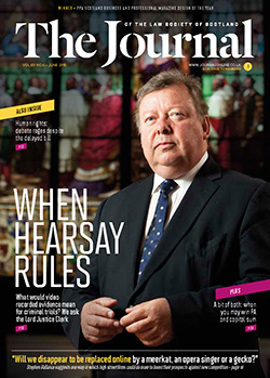Book reviews
Walker and Walker: The Law of Evidence in Scotland
4th edition
Margaret Ross and James Chalmers
PUBLISHER: BLOOMSBURY PROFESSIONAL
ISBN 978-1780435749
PRICE: £135
Legal texts vary enormously in price, and this is one priced at the upper end of the individual lawyer's budget. That said, when measured against the quality of the material, the breadth, depth and context within which the authors place their narrative and examination of the subject, this book remains to be the "go to" source on any aspect and consideration of evidence.
The book is bang up to date, and it is clear that the authors' researches have involved consideration of reported cases that may not immediately appear to relate solely to the issue of evidence: see Kapri v Lord Advocate 2014 SLT 557; 2014 SCCR 310, referred to at para 19.1.1. The book's structure follows the same as the previous edition, beginning with the admissibility and relevancy of evidence, and the burden and standard of proof, followed by a consideration of the types of evidence such as hearsay, circumstantial, confession, affidavit and opinion, including the recovery of evidence and access to witnesses.
There is a thorough treatment of each aspect. For example, in their consideration of the attack by the accused on the character of the complainer in criminal cases, the authors provide a clear, succinct background of the common law position, based on 19th century case law, in which to place their discussion of the statutory restrictions of the Sexual Offences (Procedure and Evidence) (Scotland) Act 2002, introducing ss 274-275 of the Criminal Procedure (Scotland) Act 1995. They then consider the interaction between the section and the common law: M v HM Advocate (No 2) 2013 SLT 380 is fully discussed.
Another example is the excellent treatment of identification of the accused in a criminal trial and the case law around challenges to dock identification, which, of course, Lord Bonomy has recently recommended be ended in his Post-Corroboration Safeguards Report (April 2015).
As a young lawyer, a senior colleague advised there were certain materials one should always have to hand, if one was serious about representing the case to the court, in that case, the annotated Criminal Procedure (Scotland) Act 1995. For any practitioner serious about representing themselves and their client before the court, this book should always be readily to hand.
In this issue
- Weighing the risks
- Private parking fines – are they enforceable?
- Scotland – home of (dangerous) golf
- Shareholder details: the right to refuse
- Perils of the owner-occupied croft (fuller version)
- Reading for pleasure
- Opinion: Thomas Ross
- Book reviews
- Profile
- President's column
- Land Register completion: one year in
- People on the move
- Rights: whose final say?
- The word on the street
- Screen test
- Making the best of mediation
- Keep up the payments
- The right priorities
- When reputation is not enough…
- Sports justice – being seen to be done?
- Source of disputes
- CML Handbook: the new deal
- Perils of the owner-occupied croft
- In-house and in-tune in the Commonwealth
- Stair Society seeks new blood
- New Build Standard Clauses revised
- Law reform roundup
- Leven's last hole rarely in benevolent mood
- Year of the new look
- AML just became simpler
- "My time is valuable!" Oh really?
- Learning opportunity
- Ask Ash
- Technology: slave or master?






